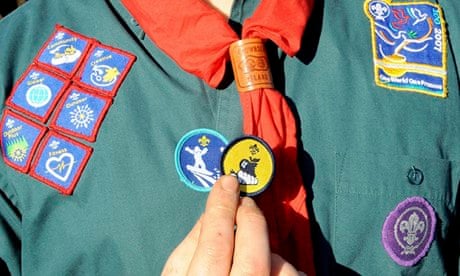From 1 January next year, atheists yearning to slip on a woggle and embrace the self-reliant yet altruistic philosophy of the Scouts will find the organisation well prepared.
After more than a century, members will no longer have to promise – on their honour – to do their duty to God when they make their pledge to the movement. They will, however, still be required to promise to uphold Scout values, observe its law, do their duty to the Queen and help others.
The introduction of the atheist-friendly pledge comes after the Scout Association, which has almost 537,000 members in the UK, spent 10 months pondering how best to welcome non-believers.
"Throughout its 106-year history, the movement has continued to evolve and today marks an important step in that journey," said Wayne Bulpitt, UK chief commissioner for the Scouts. "It also signifies the determination to become truly inclusive and relevant to all sections of society that it serves."
But he added: "We are a values-based movement and exploring faith and beliefs remains a key element of the Scouting programme. That will not change."
The Scout Association stressed that the core promise – "on my honour, I promise that I will do my best, to do my duty to God and to the Queen, to help other people and to keep the Scout law" – remained very much intact.
The atheist promise will be available to those aged eight and over; prospective Beaver Scouts, aged six to eight, have only to promise to do their best "to be kind and helpful and to love our world".
The announcement of the new provision comes four months after the Guides broke with 102 years of tradition by dropping the promise to serve God and country from their pledge. Guides now vow to "be true to myself and develop my beliefs" and "to serve my Queen and community".
The Scout Association's move to reach out to young atheists was praised by secular groups. Andrew Copson, chief executive of the British Humanist Association, said the Scouts had recognised the contribution that "thoughtful and ethical non-religious young people and adults" could make to both the movement and society.
"Their initiative sends out a strong signal that the vast majority of young people who do not see themselves as belonging to any religion have values that are worthy of respect and should be explicitly welcomed and catered for in any activity that seeks to be genuinely inclusive," he said.
The Rt.Revd Paul Butler, Bishop of Southwell and Nottingham, and the Church of England's lead bishop on work with young people said:
"In enabling people of all faiths and none to affirm their beliefs through an additional alternative promise the Scout movement has demonstrated that it is both possible - and I would argue preferable - to affirm the importance of spiritual life and not to restrict meaning to arbitrary self-definition.
Terry Sanderson, the president of the National Secular Society, also welcomed the "massive step forward", but said the Scouts would have done better to follow the "infinitely superior" example set by the Guides. "They introduced a non-religious oath for everyone," he said. "It relieves very young people of having to make a decision about what they believe at a time in their lives when maybe they haven't decided."
Sanderson was not alone in feeling the Scouts had not gone far enough. The pressure group Republic, which campaigns for a written republican constitution and an elected head of state, said it was wrong that Scouts still had to pledge their loyalty to the Queen.
"No one should have to swear allegiance to the Queen or any unelected monarch in order to join a club," said a spokesman. "We think it represents anti-democratic values that should not be celebrated."
The Scout Association, however, said it was not considering severing its royal ties.
"The Queen remains at the heart of the movement and she continues to remain as our patron," said a spokesman. "We are proud of our long-term relationship with Her Majesty the Queen. We have no intention of removing the duty to the monarchy in our promise or Her Majesty the Queen as our patron."

Comments (…)
Sign in or create your Guardian account to join the discussion